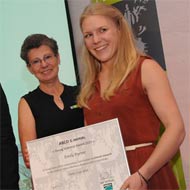
Dr Porter recognised for outstanding contributions
A researcher from the University of Bristol says she is "honoured" to have won the Young Scientist Award 2015 for her contributions to the study of feline infectious disease.
Dr Emily Porter is an associate researcher at the university's School of Veterinary Sciences. She received the award for her work on feline coronaviruses (FCoV) and feline infectious peritonitis (FIP) - a frequent cause of death in young cats.
Her research focused on a comparison of the genomic sequences of FCoVs in cats both with and without FIP.
FCoV is common in cats, particularly in multi-cat households. In fact, it is thought around 40 per cent or more cats will get it at some point in their lives, though it is usually self-limiting.
Occasionally however, it results in FIP, a viral disease that is almost invariably fatal. There is no vaccine available for either FCoV or FIP and there is no test to determine whether FCoV will mutate into FIP.
Previous research suggested specific mutations in the FCoV spike protein are a marker for FIP-associated FCoV. Dr Porter's research indicated however that these mutations are in fact markers of systemic FCoV infection - not FIP per se - and that they can be found in cats without FIP.
While this is uncommon, the findings show polymerase chain reaction (PCR) targeting those mutations cannot be used to definitively diagnose FIP.
Dr Porter also found a close relation between the viruses shed in the faeces of healthy cats and those in the tissues of cats with FIP. However, a small number of mutations distinguished the virulent from the avirulent.
Her work has laid the foundations for continued research and, further down the line, the development of genetically modified recombinant FCoVs as candidate vaccine strains.
The European Advisory Board on Cat Diseases and Merial Young Scientist Award recognises innovative and exceptional work by young professionals in the field of feline infectious disease and immunology.
The 2015 award was presented to Dr Porter at the recent congress of the International Society of Feline Medicine in Portugal.
Image (c) University of Bristol



 The RCVS has announced a new version of its 1CPD mobile app, with enhanced features for veterinary surgeons and veterinary nurses to record their continuing professional development.
The RCVS has announced a new version of its 1CPD mobile app, with enhanced features for veterinary surgeons and veterinary nurses to record their continuing professional development.